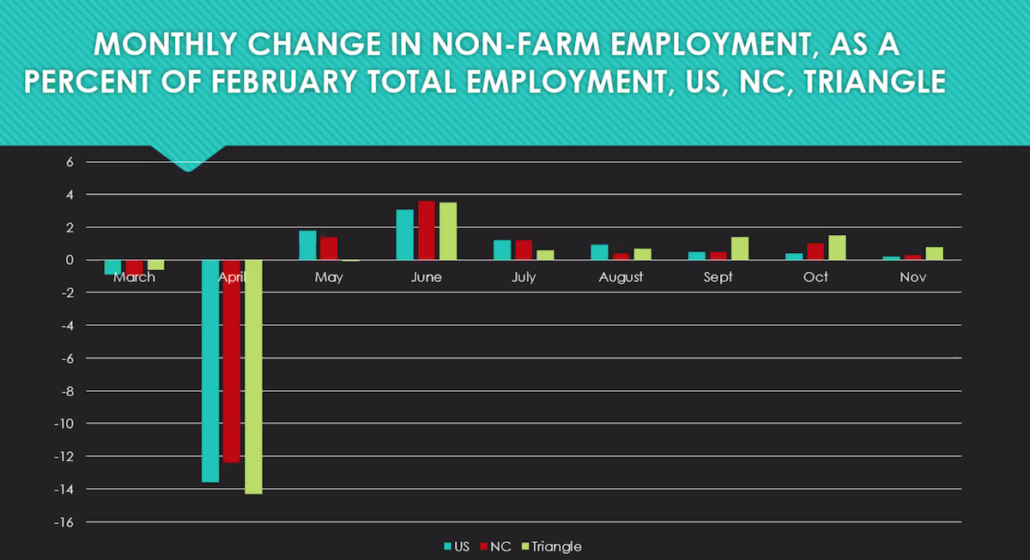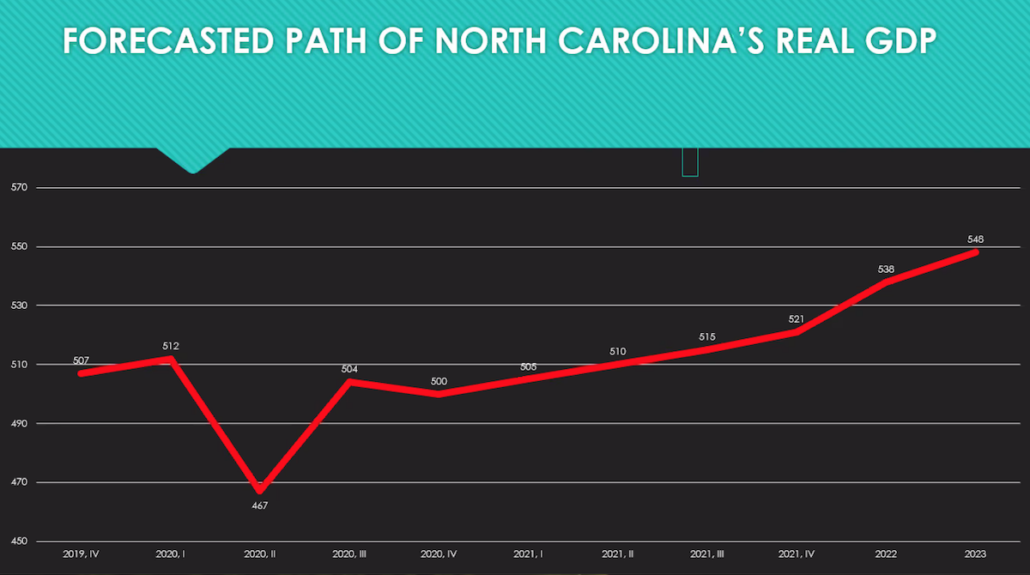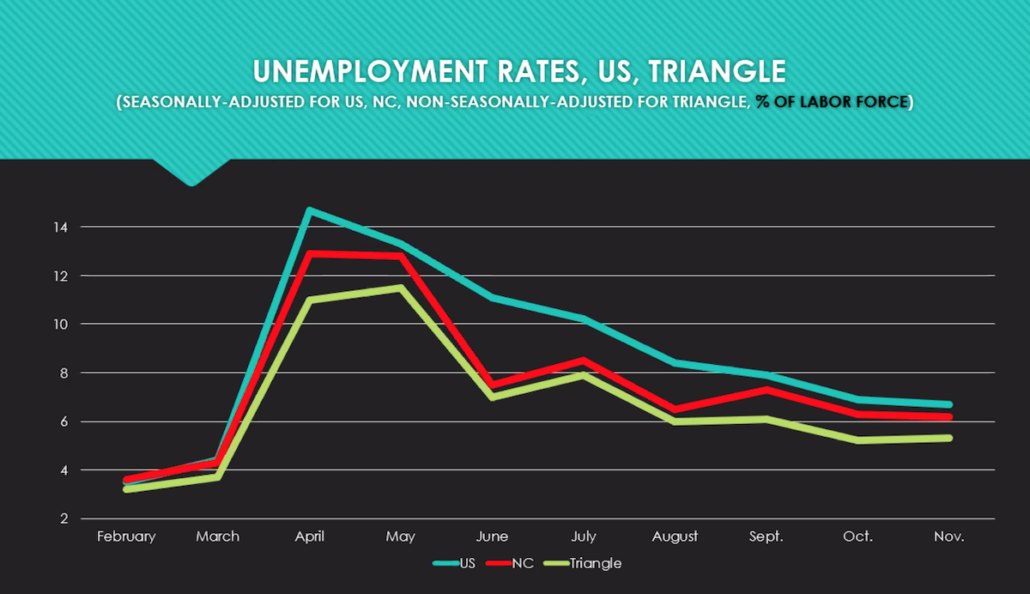Economist Predicts Optimistic 2021 Forecast
Cary, NC — This morning, renowned economist and Reynolds Distinguished Professor, Dr. Michael Walden presented his economic forecast for 2021 to hundreds of Cary Chamber members virtually.
Compared to his last Cary Chamber presentation in April 2020 on what he calls the “mandated recession” brought on by COVID-19, today’s predictions were a bit more optimistic and geared toward recovery in the region, the state and the U.S.
Job Base Roughly 95% Back in NC

April was the worst month for job losses in 2020 when Walden says “the hammer came down.” Since then, from May 2020 through today, jobs have grown each month on the national and state levels with the best trending month being June 2020.
“The bottom line here is that we have made progress,” said Walden. “In fact, if you look at the percentage of jobs that we have now in North Carolina compared to the job base that we had in Februray 2020, just before the COVID recession, we’re around 95% back.”
Here in the Triangle, the percentage of jobs added into the market from September through November 2020 beat the numbers seen at the North Carolina and national levels. The numbers for December and January are not tallied up yet, but Walden expects to see a halt in this progress from a resurgence of the virus.
Sectors Hit Hardest Deepen Income Inequality
The two biggest job-losing sectors in the United States last year (determined by a decline in economic activity and loss of jobs) were Hospitality & Leisure and Personal Services. This encompasses barbers, salons, fitness studios, restaurants, hotels and the travel industry.
“In April when we had the most devastating part of the COVID-19 recession hit us, the Hospitality & Leisure sector lost almost half of its jobs—unprecedented. I’ve never seen that in any previous recession for any sector,” said Walden.
The sectors retaining the most jobs were Financial Services, Construction and Government. Two big helping factors were that each sector was deemed essential and could continue remotely for the most part.
A key point to the “winners” and “losers” metaphor from Walden was that the majority of jobs lost were low-paying while the majority of retained jobs were high paying. Because of this, Walden warns that this pandemic-induced recession has exacerbated an already important issue — rising income inequality.
“That’s something I think we’re going to have to be worried about on the other side of this recession,” he said.
NC in Better Shape Than Most States, GDP Rebounding Strong

Walden called it correctly back in April 2020 when he predicted that North Carolina would come back fairly strong.
One way Walden backs this up is the $1 billion+ rainy day fund NC had built up before the pandemic. A second indicator is that, due to no new budget being passed by the governor and general assembly, the government continues to operate on last year’s budget and is underspending relative to revenues in recent months.
“The state controller estimates North Carolina’s got about $4 billion in the bank that we’ve not allocated or targeted for spending. So, we’re in much better shape than many other states,” said Walden.
Walden predicts a positive, continued rise in North Carolina’s GDP, with a full recovery in the third quarter of 2021.
“This doesn’t mean that we didn’t suffer during the recession. Clearly, we lost a lot of growth, but in terms of getting our economy back to the size it was, I think we’ll be there toward the end of the year,” said Walden.
For unemployment rates, however, he’s not as optimistic about.

According to his projections, the state will not return to its pre-pandemic unemployment rate of 3.8% for several years. The lowest unemployment rate he predicts is 5.4%, which he doesn’t anticipate until 2023. Why? Largely because of changes in the way of the remote, distanced workforce.
Trends: Domestic Supply Chains, Robots & Tele-Everything
World trade has been curtailed during this time due to fear of transmission, especially with China in the beginning since the virus originated there. To reduce the country’s reliance on foreign suppliers, Walden foresees continued importance in domestic supply chains in the U.S. This is particularly true of key products such as medical PPE.
Additionally, Walden believes there will be more labor disruptions, including a trend of technological unemployment in the battle between having humans or machines doing particular types of jobs. As of now, robots are already cleaning hotel rooms and even working in food processing plants. Not too far off the horizon will be drone-delivered goods.
Lastly, Walden hit on the trend of the rebuilding of education, medical visits and jobs to be transitioned online. Before the pandemic, roughly 8% of Americans worked from home compared to the 40% who do now.
2020: “A Pivotal Year in Social Economic Development”

Walden summed up 2020 as a year we’re all happy to see go, but it was also pivotal in that it’s accelerated a lot of trends and made several permanent changes to the U.S. and local economies. Walden left meeting participants with this final prediction:
“My guess is when the Biden administration submits their first budget, there’s going to be more money in that budget for trying to watch the development of viruses,” said Walden. “I think we want to spend more money in trying to detect those and I would not be surprised to see a proposal to try to elevate our activities in this to a cabinet-level department.”
Story by Ashley Kairis. Images screen captured from the live Cary Chamber event.
All the Cary news for the informed Cary citizen. Subscribe by email.




Taking pandemics seriously enough for a cabinet position and the “buck stops here ” approach would surely be an improvement if the new administration decides to do that.
And as usual, Cary faired better than NC that faired better than most of the US. Sure glad we chose to live here 23 years ago.